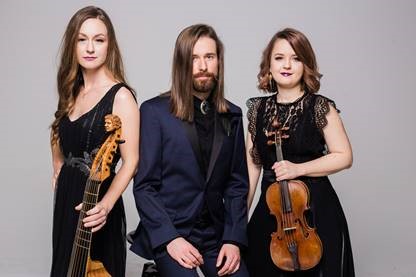French baroque music is characterised by a remarkable artistic mastery and the refinement of expressive means used by the composers of the time. In this concert the soprano Claire Lefilliâtre and the ensemble Overtone, specialising in early music performance on period instruments, will present various works of male composers and one female composer representing this genre in the history of music.
Jean-Baptiste Morin was born in Orléans and spent most of his life there. A significant time, for both the French composer’s life and for his output, was his service at the court of Philippe, Duke of Orléans, the future regent. There Morin was a kapellmeister, and one of the musicians who performed for the monarch. His output bears the marks of a synthesis between the light French style and the Italian one – especially in the cantatas. One of these – Le naufrage d’Ulisse, a work from the set Cantates françoises à une, et à trois voix, avec simphonie – will be performed by the artists this evening. The concert programme also includes also two other compositions by Morin – Ouverture and Chaconne from the 1714 divertissement L’Himen et l’amour Op. 7, which is a kind of epithalamium. The merger of the French and Italian styles in music was furthered by Nicolas Bernier. As with Morin, the composer managed to reach a perfect balance between these two styles, if only on the expressive level – as can be heard in the cantata Médée, created at the beginning of the 18th century.
Marin Marais made his mark in history as a viola da gamba virtuoso and a valued composer. He was a student of Jean-Baptiste Lully himself, and it was with him that he developed his performance technique. Most of his works are for an ensemble that features his instrument. These include La Mariée from Suite en la mineur from Pièces de viole and Menuet fantasque & Double from Suite en sol mineur. Jacques Duphly, who worked in the period of late baroque and early classicism, was an extraordinary French harpsichord player. It is not surprising then that his output is concentrated on this instrument. Troisième livre de pièces de clavecin is an example of the set of small compositions in which the author demonstrates the timbre and articulation possibilities of the harpsichord. The concert will also include a composition by Élisabeth Jacquet de la Guerre, a harpsichordist and composer from an artistic family, who is considered one of the greatest composers active in 17th- and 18th-century Paris. A wonderful opportunity to listen to her music is the cantata Judith, from the set Cantates françoises sur des sujets tirez de l’écriture.

Jean-Baptiste Morin Ouverture from L'Himen et l'amour op. 7
Nicolas Bernier Médée – cantata
Marin Marais La Mariée z Suite en la mineur from Pièces de viole (Livre V, Paryż 1725)
Elisabeth Jacquet de la Guerre Judith – cantata from Cantates françoises sur des sujets tirez de l'écriture (Livre I, Paryż 1708)
Jacques Duphly Médée from Troisième Livre de Pièces de Clavecin (Paryż 1756)
Marin Marais Menuet fantasque & Double from Suite en sol mineur (Livre III, Paryż 1711)
Jean-Baptiste Morin Le naufrage d'Ulisse – cantata from Cantates françoises a une, et a trois voix, avec simphonie (Paryż 1712); Chaconne from L'Himen et l'amour op. 7
Claire Lefilliâtre – soprano
Overtone:
Klaudia Matlak – violin
Julia Karpeta – viola da gamba
Maurycy Raczyński –harpsichord
Dohyo Sol – theorbo
